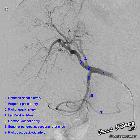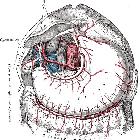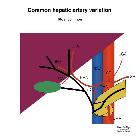Arteria hepatica communis





The common hepatic artery (CHA) is one of the 3 branches of the celiac artery.
Gross anatomy
Origin
The common hepatic artery is normally a terminal branch of the celiac artery, the largest branch coursing to the right.
Course
It passes anterior to the pancreas, and then inferiorly to the right in the lesser sac towards the first part of duodenum. It gives off the right gastric artery, which runs superiorly along the right half of the lesser curvature of the stomach to anastomose with the left gastric artery. The common hepatic artery then passes slightly upwards where it runs anterior to the portal vein and medial to the common bile duct in the free edge of the lesser omentum. As it courses towards the porta hepatis it gives off the gastroduodenal artery inferiorly, after which it becomes the proper hepatic artery.
Branches
- right gastric artery
- terminal branches
Variant anatomy
Variation in hepatic arterial anatomy is seen in 40-45% of people. Classic branching of the common hepatic artery from the celiac artery, and the proper hepatic artery into right and left hepatic arteries to supply the entire liver, is seen in only 55-60%.
A single or double cystic artery may arise off the proper hepatic artery.
For further details, see variant hepatic arterial anatomy.
Relevant pathology
Siehe auch:
- hypervaskularisierte Leberläsionen
- Truncus coeliacus
- Varianten der arteriellen Leberversorgung
- Arteria gastroduodenalis
- Aneurysma spurium Arteria hepatica
- Arteria hepatica propria
- Aneurysma Arteria hepatica
- hepatic arterial resistive index
und weiter:

 Assoziationen und Differentialdiagnosen zu Arteria hepatica communis:
Assoziationen und Differentialdiagnosen zu Arteria hepatica communis:


